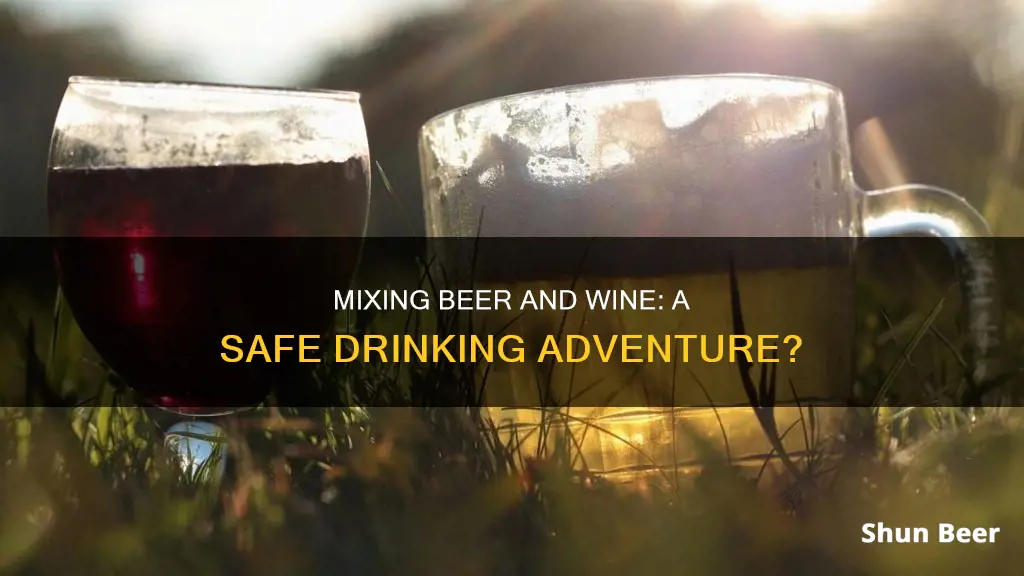
Mixing beer and wine is a controversial topic. While many people are against it, there is no scientific evidence that drinking them in a particular order will make you sick or increase the risk of a hangover. A 2019 study by the University of Cambridge found no correlation between hangover symptoms and whether subjects drank only wine, only beer, or switched between them in either order. However, drinking too much alcohol may lead to feeling ill and an increased chance of a hangover, so moderation is key.
| Characteristics | Values |
|---|---|
| Mixing Beer and Wine | Controversial topic that many people are against |
| Drinking Beer and Wine in Different Orders | It is a myth that drinking beer and wine in a particular order will make you sick or increase the risk of a hangover. |
| Mixing Beer and Wine and Feeling Sick | Mixing beer and wine can increase the likelihood of feeling sick due to the combination of different types of alcohol. However, individual tolerance and consumption amount also play a role. |
| Beer and Wine Together and Hangover | It is not the order of drinking beer and wine that causes a hangover but the overall intake. |
| Beer and Wine Mix Drinks | Beer and wine mixes are called hybrids. |
What You'll Learn
- Beer and wine can be mixed without causing sickness or a worse hangover
- Drinking too much of either can lead to feeling unwell and an increased chance of a hangover
- The old saying beer before wine and you'll feel fine; wine before beer and you'll feel weird is not true
- Carbonated drinks can make you absorb alcohol faster, but this doesn't affect the order in which you drink beer and wine
- Beer and wine hybrids are available on the market, such as Midas Touch by Dogfish Head Brewery

Beer and wine can be mixed without causing sickness or a worse hangover
Mixing beer and wine is a controversial topic, with many people warning against it. However, science suggests that it is perfectly fine to mix beer and wine without causing sickness or a worse hangover. While there are many old sayings such as "beer before wine and you'll feel fine; wine before beer and you'll feel weird", there is no scientific evidence to support these claims.
Firstly, it is important to understand that experiencing a hangover or feeling sick while drinking is primarily due to the amount of alcohol consumed and the time period over which it is consumed. A healthy adult body can only eliminate one standard drink (or 10 grams of alcohol) per hour. If you consume more alcohol than your body can eliminate, you are more likely to feel sick. This is because the body first converts alcohol into acetaldehyde, a chemical similar in structure to formaldehyde and quite toxic.
Mixing drinks may not be advisable as it can make it harder to keep track of how much alcohol you have consumed. Additionally, switching from a beverage with a low alcohol content to one with a higher content can increase your drinking rate. For example, if you start with wine and then switch to beer, you may drink the beer faster and consume more than intended. This could explain why some people feel worse after drinking wine followed by beer.
However, studies have shown that the order of drinking beer and wine does not affect sickness or hangovers. A 2019 study at the University of Cambridge found no evidence that mixing wine and beer in any specific order increased the risk of feeling sick or having a worse hangover. The only factor that influenced these outcomes was the total amount of alcohol consumed.
In conclusion, while it is generally safe to mix beer and wine, it is important to drink in moderation and be mindful of your total alcohol intake to avoid negative consequences.
MLB Dugout Drinking Culture: Beer and Beyond
You may want to see also

Drinking too much of either can lead to feeling unwell and an increased chance of a hangover
Drinking beer and wine together will not make you sick or increase the risk of a hangover. However, drinking too much of either can lead to feeling unwell and an increased chance of a hangover. This is because alcohol is absorbed rather well and rather quickly by the body, regardless of the source.
The amount of alcohol consumed is the most significant factor in determining the severity of a hangover. The old saying, "Beer before wine and you'll feel fine; wine before beer and you'll feel weird," is not supported by scientific evidence. The order in which you drink beer and wine does not affect how your body processes alcohol or increase the risk of a hangover.
That being said, it is important to note that wine generally has a higher alcohol percentage than beer. Therefore, you may feel the effects of wine more quickly than beer. If you start drinking wine and then switch to beer, you may consume more beer in a shorter amount of time to maintain the same level of effects as the wine. This increased consumption of beer over a short period can lead to feeling unwell and an increased chance of a hangover.
Additionally, the carbonation in beer can cause increased alcohol absorption. The bubbles in carbonated beverages stimulate the pyloric sphincter muscle, which regulates the flow of food and drink from the stomach to the intestine. When this muscle is stimulated, it opens and allows for a faster passage of alcohol into the intestine, leading to quicker absorption.
In conclusion, it is not the mixing of beer and wine that increases the risk of a hangover, but rather the total amount of alcohol consumed. Drinking in moderation and staying hydrated are important to mitigate the negative effects of alcohol consumption, including hangovers.
Alcohol-free beer: A safe drink for liver disease patients?
You may want to see also

The old saying beer before wine and you'll feel fine; wine before beer and you'll feel weird is not true
Mixing beer and wine is a controversial topic, with many people holding strong beliefs about the order in which the two drinks should be consumed. The old saying goes: "Beer before wine and you'll feel fine; wine before beer and you'll feel weird." However, scientific studies have found that this saying is not true.
The saying likely persists due to a combination of folklore, individual experiences, and the different alcohol content in beer and wine. In the past, beer was typically lighter and had a lower alcohol content than the wines available. As such, starting with beer and moving on to wine once you felt buzzed made sense. Wine, with its higher ABV, would then be enjoyed in smaller quantities, potentially reducing the risk of a hangover.
However, this saying has been debunked by scientific studies. In 2019, a study at Cambridge University found no difference in hangover severity based on the order of drinks. 90 volunteers consumed either beer followed by wine or vice versa, and the results showed that the total amount of alcohol consumed was the key factor in determining hangover intensity, not the order of drinks. This was further supported by another study from Witten/Herdecke University, which also found no difference in hangover severity based on drink order.
While mixing beer and wine is safe and will not make you sick, excessive consumption of alcohol in any form can lead to negative consequences. Hangovers are caused by dehydration and the presence of acetaldehyde, a toxic byproduct of alcohol digestion. Therefore, it is important to drink in moderation, stay hydrated, and ensure proper nutrition before consuming alcohol to mitigate the risk of hangovers and other adverse effects.
In conclusion, the old saying "beer before wine and you'll feel fine; wine before beer and you'll feel weird" is not supported by scientific evidence. The key to avoiding negative consequences when drinking beer and wine is moderation, not the order of consumption.
German Beer and Gluten Sensitivity: What's the Verdict?
You may want to see also

Carbonated drinks can make you absorb alcohol faster, but this doesn't affect the order in which you drink beer and wine
Carbonated drinks can indeed make you absorb alcohol faster. This is because carbonation increases the pressure in your stomach, helping to force alcohol into your bloodstream via the stomach lining. However, this does not affect the order in which you drink beer and wine.
While many people believe that drinking beer before wine will result in feeling fine, and drinking wine before beer will make you feel weird, this is simply not true. The order in which you drink beer and wine does not matter. What matters is how much you drink. If you drink too much, you will likely feel sick, either that night or the next morning.
The myth that drinking wine before beer will make you feel drunker may come from the fact that wine has a higher ABV than beer. Therefore, if you drink the same volume of wine as you would beer, you will be consuming more alcohol. However, this does not mean that you will get drunk faster or feel sicker if you drink wine before beer.
Similarly, drinking beer after wine does not mean that you will feel fine. While beer typically has a lower ABV than wine, drinking it after wine will not magically make you less drunk or prevent a hangover. Again, what matters is the total amount of alcohol consumed, not the order in which you drink it.
So, whether you're drinking beer, wine, or a mix of both, always remember to drink responsibly and in moderation.
Drinking Beer in Public: Japanese Laws and Customs Explained
You may want to see also

Beer and wine hybrids are available on the market, such as Midas Touch by Dogfish Head Brewery
Mixing beer and wine is a controversial topic, with many people believing that drinking them in a certain order will affect how your body processes the alcohol. However, science has proven that it does not matter in which order you consume wine and beer, and that drinking them together will not make you sick or increase the risk of a hangover. It is the amount of alcohol consumed that will affect how you feel, not the order in which you drink them.
Dogfish Head Brewery has been a pioneer in the beer-wine hybrid movement, with Midas Touch being one of their most popular creations. Inspired by ingredients found in 2,700-year-old drinking vessels from the tomb of King Midas, this hybrid is brewed with white Muscat grapes, barley, wildflower honey, and saffron. It offers a unique drinking experience, combining the richness and complexity of wine with the brightness and refreshment of beer.
In addition to Midas Touch, Dogfish Head has also created other beer-wine hybrids such as Mixed Media, Red & White, Noble Rot, and Sixty-One. Other notable breweries experimenting with beer-wine hybrids include Block 15 Brewing Co., Captain Lawrence Brewing Co., Russian River Brewing Co., and Cascade Brewing Barrel House.
These hybrids offer a unique drinking experience that blurs the lines between beer and wine, appealing to those who enjoy exploring different flavours and styles of alcohol. While the concept of combining beer and wine may seem unusual to some, it has gained traction in the craft beer scene, with more breweries experimenting with wine barrel-aging and wine ingredients in their beers.
Exploring Galveston Beach: Can You Enjoy Beer There?
You may want to see also
Frequently asked questions
Yes, it is safe to drink beer and wine together. There is no evidence that drinking them in a particular order will make you feel sick or increase the risk of a hangover.
No, it does not matter if you drink wine or beer first. A study by the University of Cambridge found no evidence that mixing wine and beer in a specific order would speed up the alcohol's effect or make you feel sicker.
Mixing beer and wine will not give you a hangover. However, drinking too much alcohol will give you a hangover. Wine is particularly likely to result in a bad hangover due to congeners, byproducts of fermentation.
Drinking beer and wine together may make you feel sick, but only if you consume too much. It is important to drink in moderation and stay hydrated.
Yes, there are beer-wine hybrids and cocktails that mix the two. An example of a beer-wine hybrid is Midas Touch by Dogfish Head Brewery, and an example of a cocktail is Black Velvet, which is made with equal parts Champagne and Stout beer.







